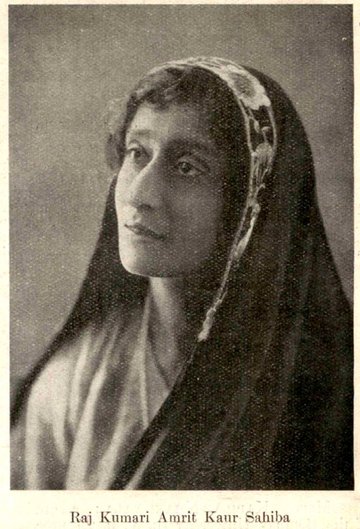
Rajkumari Amrit Kaur
‐
Indian princess who was head girl at Sherborne School in Dorset and a prominent Indian suffragist and politician
Place of birth
Date of arrival to Britain
Location(s)
Bradford Road
Sherborne
DT9 3QN
United Kingdom Royal Holloway College
Egham
TW20 0EX
United Kingdom
Place of death
New Delhi, India
Date of time spent in Britain
1902–8, 1933, 1945
About
Rajkumari Amrit Kaur was the daughter of the Raja Harnam Singh, a member of the princely family of Kapurthala State, and Priscilla Golaknath. Accounts vary but she was born in Kapurthala Palace in Lucknow in either 1887 or 1889. Amrit Kaur was raised in the Christian faith and was the first Indian to study at Sherborne School for Girls in Dorset. She joined the school in 1902 and left in 1906 as head girl and captain of games. Amrit Kaur had first visited Britain in 1902 at the age of 11 or 12 with her father to attend the coronation of Edward VII. She stayed on at Sherborne, living with a group of other girls in the Headmistress’s house during the term, and spent holidays with Mary Kinnaird, the founder of the Young Women’s Christian Association (YWCA), and the Wingfield-Digbys, the owners of Sherborne Castle. After leaving Sherborne, she had a few months of further study at Royal Holloway College for Women (although she did not sit any exams there or at Oxford University, which she also attended), where she met Neil Bonarjee. She returned to India in 1908 and was soon drawn into nationalist politics.
Amrit Kaur was a member of the All India Women’s Conference in India from its inception and became heavily involved in the Indian suffrage movement in the 1920s and 1930s. She returned to London in 1933 to present demands on behalf of Indian women to a Joint Parliamentary Committee for Indian Reform. During her time in London, she met with many women’s groups like the British Commonwealth League and attended afternoon parties in her honour.
Amrit Kaur’s parents died in 1924 and 1930 leaving her independently wealthy. She did not marry or have any children. Amrit Kaur served as one of Mahatma Gandhi’s private secretaries for sixteen years and was an active member of the non-cooperation movement. She became a prominent women’s rights activist in India, especially after 1926, and was the first Minister of Health in independent India in 1947 (and the first female cabinet member of independent India). In 1945 she was part of the Indian delegation at a meeting in London to create the United Nations Educational, Scientific and Cultural Organization (UNESCO). In 1950 Amrit Kaur was elected as the President of the World Health Assembly, which governed the World Health Organization. She was the driving force behind the foundation of the All India Institute of Medical Sciences (AIIMS) and served as its President until her death. Amrit Kaur died in New Delhi in 1964.
All India Women’s Conference, British Commonwealth League, Women’s Indian Association.
Borkar, G. (ed.) Selected Speeches and Writings of Rajkumari Amrit Kaur (New Delhi: Archer Publications, 1961)
Eminent Parliamentarians Monograph Series: Rajkumari Amrit Kaur (New Delhi: Lok Sabha Secretariat, 1993)
Mukherjee, Sumita, Indian Suffragettes: Female Identities and Transnational Networks (New Delhi: Oxford University Press, 2018)
Parr, Rosalind, Citizens of Everywhere: Indian Women, Nationalism and Cosmopolitanism, 1920–1952 (Cambridge: Cambridge University Press, 2021)
Rook-Koepsel, Emily, ‘Constructing Women’s Citizenship: The Local, National, and Global Civics Lessons of Rajkumari Amrit Kaur’, Journal of Women's History 27.3 (2015), pp. 154–75
Mss Eur F341/146, Rajkumari Amrit Kaur, Forbes Collection, Asian and African Studies Reading Rooms, British Library, St Pancras
7ELR/24, Rajkumari Amrit Kaur, Eleanor Rathbone Papers, The Women’s Library, London School of Economics and Political Sciences, London
Rajkumari Amrit Kaur Private Papers, Nehru Memorial Museum and Library, New Delhi, India
Sherborne School for Girls, Dorset
Image credit
By unknown author – The Modern Review
Public domain, via Wikimedia Commons, https://commons.wikimedia.org/w/index.php?curid=122860423
